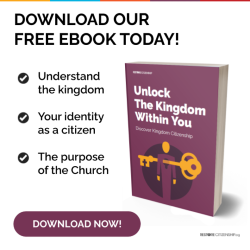Discover what the bible has to say about the purpose of law, types of law and how law is enshrined?
Without law, government cannot successfully exist. The law is the definable will legislated by the King. The law cannot be separated from the Kings will, and therefore constitutes both His personality as much as His sovereignty.
Defining the 'LAW'
Dictionary definition:
'the principles and regulations established in a community by some authority and applicable to its people, whether in the form of legislation or of custom and policies recognized and enforced by judicial decision'
Wikipedia definition:
'Law is a system of rules and guidelines, usually enforced through a set of institutions'
The purpose of the 'LAW'
-
Life – Protection of the rights of individuals in a given territory.
-
Liberty – Protection of the terms & conditions in which individuals relate within a given territory.
-
Property – Protection of property owned within a given
Who makes the 'LAW'
Ownership necessitates the creation of laws. The author of life, liberty and property defines the law.
-
A deity (God).
-
A man. (King, Monarch)
-
A group of men. (Types of Government)
In keeping with the scriptures:
BIBLICAL LAW – THE GENESIS ACCOUNT
AUTHOR - The bible declares that God owns everything because he created it (Heavens & Earth). Read Genesis 1:1.
LIFE - God declares that as everything was created according to his laws it was good. Read Genesis 1:4,10, 12, 18, 21, 25.
LIBERTY - God declares “very good” as all creation worked harmoniously together. Read Genesis 1:31
PROPERTY - God installs Adam as a delegated sovereign to govern and protect what He has put in place.
Read Genesis 1:28, 2:19-20.
Thus following biblical pattern man was ordained under God to exemplify His sovereign will within the jurisdiction or territory of the earth. Adams rebellion represented a rejection of the sovereign rule of God and has in effect contributed to the ongoing development of subsequent kingdoms throughout the ages. Whether ruled by one or many these kingdoms have never existed without the concept of Law.
How the Kingdom citizen should view the 'LAW'
Isaiah 33:22 'For the Lord is our Judge, The Lord is our Lawgiver, The Lord is our King; He will save us;
The law is the definable will of the King legislated and enforced within the sphere of His realm or domain. The law must be seen as the expression of the King rather than a set of rules specific for ruling His subjects alone.
It is unfortunate that amongst believers today the Old Testament covenants and that which pertains to the law of God are NOT seen as an expression of the sovereigns will but rather as religious requirements and duties subject to history alone.
What constitutes the Kings personality cannot be separated from His sovereignty. Within the Kingdom of God is it possible to identify within the law what constitutes the Sovereigns personality and what constitutes His sovereignty. Unreservedly YES!
Within the Old Testament the law revealed to the Israelites through Moses and known as the Ten Commandments were direct expressions of God’s personality and characteristics.
Characteristics of the Ten Commandments
1. Written personally by God.
2. Mediated personally between God and Moses.
3. Mediated personally between Moses and the people.
4. In keeping with God’s personality and characteristics the Ten Commandments are deemed as having eternal ramifications.
Matthew 5:18 'For verily I say unto you, Till heaven and earth pass, one jot or one tittle shall in no wise pass from the law, till all be fulfilled'
5. The Ten Commandments focused upon the Israelites expression of devotion to God personally. Deuteronomy 10:12
In conjunction with the Ten Commandments is The Book of the Law or the Mosaic Covenant. The Book of the Law identified the sovereign relationship between God and Israel. Read Deuteronomy 30:10
Characteristics of the book of the law
1. Recorded and written by Moses. Read Exodus 24:1-7
2. Placed within the Ark of the Covenant. Deuteronomy 31:26
3. Understood as a witness against the people. Read Deuteronomy 31:26
4. The Book of the Law / Mosaic Covenant focused upon God’s sovereignty over a devoted people.
5. The Book of the Law was established as a way of mediating God’s sovereignty amongst his chosen people.
The bible interchangeably uses the term “The Law” for both The Commandments and The Mosaic Covenant. The Sovereigns characteristics revealed through biblical monarchies. It was an indispensable trait that future kings, standing in an appointed position of authority, embrace both the Ten Commandments and The Book of the Law as their own to represent God both within personality (characteristics) and sovereignty.
Read Deuteronomy 17:18-20
18 “Also it shall be, when he sits on the throne of his kingdom, that he shall write for himself a copy of this law in a book, from the one before the priests, the Levites.
19 And it shall be with him, and he shall read it all the days of his life, that he may learn to fear the LORD his God and be careful to observe all the words of this law and these statutes,
20 that his heart may not be lifted above his brethren, that he may not turn aside from the commandment to the right hand or to the left, and that he may prolong his days in his kingdom, he and his children in the midst of Israel.
Hence the fall of King Saul and the rise of King David carried the hallmark of this most important quality.
1 Samuel 13:14 “But now your kingdom shall not continue. The LORD has sought for Himself a man after His own heart, and the LORD has commanded him to be commander over His people, because you have not kept what the LORD commanded you.”
Acts 13:22 “And when He had removed him, He raised up for them David as king, to whom also He gave testimony and said, ‘I have found David the son of Jesse, a man after My own heart, WHO WILL DO ALL MY WILL.'
These qualities were also characteristic of Christ and were the foundational building blocks for the Kingdom of God.
Matthew 5:17 “Do not think that I came to destroy the Law or the Prophets. I did not come to destroy but to fulfil'
Matthew 5:19 'Whosoever therefore shall break one of these least commandments, and shall teach men so, he shall be called the least in the kingdom of heaven: but whosoever shall do and teach them, the same shall be called great in the Kingdom of heaven'
John 15:10 “If you keep My commandments, you will abide in My love, just as I have kept My Father’s commandments and abide in His love”
The Word of Christ is the law in God’s Kingdom and is in keeping with the Old Testament characteristics of a monarchy personally and characteristically devoted to the Ten Commandments.
The word of the King is law because it reflects both His personal characteristics and sovereignty. Jesus stated, “He who rejects Me, and does not receive My sayings, has one who judges him; the word I spoke is what will judge him at the last day” (John 12:48). Jesus also warns us of seeking to represent His sovereign authority without his personality and characteristics.
Matthew 7:22-23 'Many will say to Me in that day, ‘Lord, Lord, have we not prophesied in Your name, cast out demons in Your name, and done many wonders in Your name?’
23 And then I will declare to them, ‘I never knew you; depart from Me, you who practice lawlessness!”
Whilst we live within a world of ever changing landscapes dictated by various forms of authorities and governments, Kingdom citizens must diligently search the scriptures to understand how the laws of their sovereign work within the domain of His people.
For King and for country...





